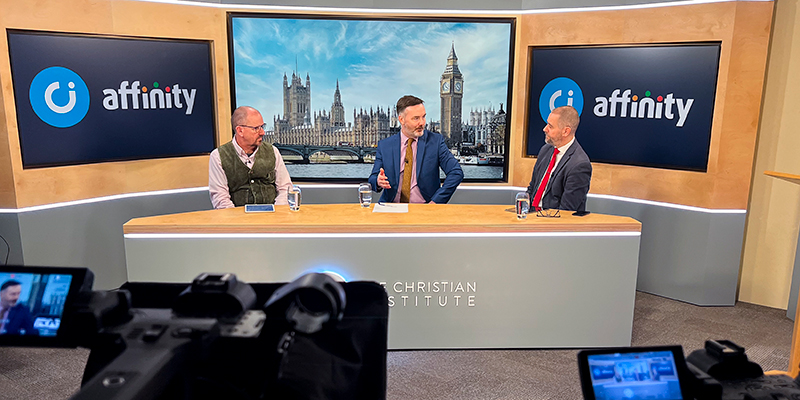
Prosecuting parents and pastors
A conversion therapy law could damage family life and gospel freedom, viewers were warned in a recent webinar jointly hosted by The Christian Institute and Affinity.
More than 600 people tuned in live, and well over 5,000 have since watched the webinar titled ‘Prosecuting Parents and Pastors’, which looks at the potential impact of the Westminster Government’s proposed conversion therapy law on prayer, pastoral conversations and parental guidance.
Simon Calvert, Deputy Director of The Christian Institute, explained that the big problem with a conversion therapy law is the definition.
Graham Nicholls, Director of Affinity, spoke about how the proposals could affect the ordinary work of churches and family life.
And Mike Judge, Editor of The Evangelical Times, talked about the many opportunities there are to engage and take action.
Speaking about the problem with defining conversion therapy, Simon stated: “No one knows what conversion therapy means”.
“If it means ‘abuse’ then that’s already illegal. Christians oppose it. But if conversion therapy means harmless conversations – conversations that reflect Christian beliefs or the reality of biological sex – then those conversations are perfectly legitimate, they are protected by human rights law, and they cannot and must not be criminalised.”
He warned that “campaigners insist on putting practices that are clearly abusive like electroshock therapy on a gay person into the same category as praying with a gay person or talking with a gay person about the Christian faith”, concluding: “It’s not abuse they want to outlaw. It’s opinions.”
Simon went on to explain that there have been at least fourteen legal opinions from leading King’s Counsel and that each one has concluded that a conversion therapy law is likely to breach Articles 8, 9, 10 and 11 of the European Convention on Human Rights.
“It’s an impossible task”, he said. “It’s a circle that cannot be squared. We have long experience of Governments acknowledging free speech and religious liberty concerns but then – often inadvertently – pushing forward with proposals which trample on those freedoms anyway.”
Speaking as a pastor and a parent, Graham said he was “deeply concerned”, and warned that a conversion therapy law could “affect ordinary pastors… everyday parenting… Christian parents chatting with their children and… normal youth work”. He explained the various ordinary church and parenting scenarios which could be caught by the proposed law.
For example, you are a parent and your 12-year-old daughter says she’s been given a talk about gender at school and now think she’s a boy in a girl’s body. You tell her you understand it can be confusing as we grow up and that many girls like to do stereotypically boy things, but it doesn’t mean they are a boy. You explain that of course as her parents you will love and support her as she grows up, but you can’t allow her to do anything that would harm her. You could be found guilty of conversion therapy for not affirming your daughter’s expression of her ‘gender identity’.
Mike, who is also a pastor and Editor of The Evangelical Times, encouraged people that there is much that can be done to oppose a conversion therapy law, emphasising that “there really is all to play for”.
He pointed out that a growing number of countries have tried and failed to introduce a conversion therapy law because “it’s impossible to write a law which satisfies the radical activists who are demanding it, without jeopardising the free speech of parents, of pastors and of medical professionals”.
He reminded people that many “in Westminster and in Whitehall have got very little experience of ordinary church life and Christian family life”, and that it’s up to us to give them an accurate understanding of our “reasonable and justified concerns about freedom of speech and religious liberty”.
Adding: “We need to tell the Government that — whether we are parents in the home or whether we are pastors in the church — we do believe in the importance of offering pastoral care and guidance which lines up with our sincerely held beliefs about human identity and sexuality.
“Yet sadly, if a ban does come in, it could be that even the most benign conversations, or the most careful of prayers, could be misconstrued as a crime.”
He went on to explain that: “A law that penalises certain viewpoints effectively imposes a state-endorsed ideology and simply marginalises those who take a different view. Now that is a dangerous path, one that erodes freedom that underpins our democratic society”.
He encouraged people to sign up to the Let Us Pray campaign to be kept up-to-date with news of where the proposals are at, and for help with how and when to contact politicians.
The webinar concluded with a lively Q&A.
Asked how likely the Government is to conclude it’s too difficult, Simon explained: “It’s important that we use every opportunity to push back. For example when the Private Member’s Bills were proposed [last year], some people sort of argued that we don’t need to worry about them, they are never going to become law. But our concern was that this was going to advance the argument, so we made sure that we pushed back. We briefed. There was a huge alliance of people working together. The result was that we smashed those Bills and we pushed back the cause. This is one of those issues… where the more people see of it, the less people like it.”
Mike added: “It also underlines the fact that you have to keep on making the argument… If we do, then the experience has shown that people will drop these proposals.”
Plans to outlaw conversion therapy – what to expect in 2026?
2025-12-23 09:47:27Aus Christians unite against extreme conversion therapy law
2025-12-10 12:15:40
